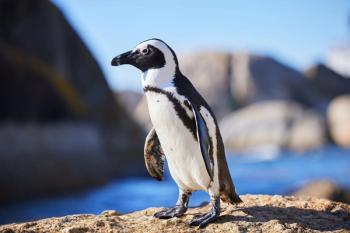
Exotic animal practice tips (Proceedings)
Do not aggressively palpate females with distended coeloms or over-restrain for procedures (preovulatory stasis, egg bound, egg yolk peritonitis).
Practice Tips for Reptiles
-Place on substrates that are not easily ingested – no calcium containing sand
-Feed appropriately sized food and prey items
-In iguanas & some of the other lizards recommend spaying/neutering prior to sexual maturity
-Discuss long term problems of keeping reproductively intact
-Do not aggressively palpate females with distended coeloms or over-restrain for procedures (preovulatory stasis, egg bound, egg yolk peritonitis)
-Kidney disease prevalent in adult iguanas probably due to chronic dehydration and high protein diets when they were young
-Encourage feeding of dead prey – fresh killed/frozen
-Live prey should be removed if not eaten within five minutes
-Tail amputation done manually at natural breaking planes
-Do not suture
-Snakes that are preshed will have a rosey "glow" to the ventrum which is different than the petecchial hemorrhages that are seen with snakes with septicemia
-Warn clients of possible long erm complications and dysfunction from early severe NSHP
-Ivermectin – not in turtles, tortoises and indigo snakes; w/caution in skinks; not w/in 10 days of ketamine use
-Standing lateral view allows for better visualization of air space, better definition of ileus and more information in lizards
-Careful what you say!
"Keep warm during transport"
"Swim once per day"
"Increase the temperature of the cage"
"Give this once per day"
-Specific swimming recommendations
-Specific recommendations on heat changes
-NEVER ASSUME
-Thermal burns are common as heat receptors are not the same as pain receptors and will seek heat especially if ill
-No ICe fluids w/space occupying lesion
-Annual PE, biannual fecal exams
-Specific swimming recommendations
-Not all "Reptile Lights" are the same
-Define "gut loading" insect prey items
-Discuss Salmonella risks w/all clients
-Brochure on Salmonella and Reptiles available through ARAV
-ANY disease process or procedure that is considered painful in other species should be considered painful in reptiles!
Practice Tips for Small Mammals
-It is safer to place a rabbit backwards into a cage to prevent injury from kicking as you place it in.
-Keep head elevated and neck uncrimped when rabbits and guinea pigs are anesthetized
-Do not tie legs, gently tape them out of your field
-Non-herbivorous small mammals should have only limited fasting - four hours or less - prior to surgery
-Never fast rabbits and guinea pigs for surgery
-Check for subgingival spurs of the 1st upper PM in chinchillas that is interested in food but not eating
-Guinea pigs will readily walk off the edge of the table so should always be carefully monitored.
-Kidney changes such as cysts and hydronephrosis can be seen in ferrets that were fed melamine contaminated cat food
-Obesity is an increasing problem in exotics and clients should be counseled early about nutrition and exercise
-Always provide a towel for traction on the exam table.
-Provide food items after oral exam
-Hedgehogs, hamsters and other small mammals - can be difficult to examine their ventrum awake: place in clear plastic container to see ventrum
-Dental procedures in small mammals should not be performed without proper speculums
-Never pull tongue outside of mouth
-Don't forget that other small mammals need dental care too: ferrets, coatamundi, pot bellied pigs, etc,
-Never lift rabbits and guinea pigs up by the scruff or pick rabbits up by the ears. .
-Keeping patients warm during surgery is important but it is easy to overheat small mammals that are not carefully monitored.
-Rabbits and ferrets should never be declawed.
-Alopecia of the lateral abdomen or flanks can indicate pain, can be d/t hormonal changes.
-The risk of anesthesia is much less than the risk of reproductive problems in rabbits
-Consider the same for guinea pigs and rats
-Examine the penis of male guinea pigs to check for hair and sebaceous secretions that may build up
-Never shave the bottom of the hind feet of rabbits.
-Perivascular necrosis can occur with extravasation of injectable drugs in the marginal ear vein of rabbits.
Practice Tips for Exotics
-Create a hospitalization ward for exotics away from other pets and rooms with ability to change temp and humidity for reptiles and birds
-Keep fish wet with the water they arrived in and place them often back into the water between procedures, wear exam gloves and wet them as well
-Venipuncture in fish can be done with fish anesth. or awake and taken from just ventral to the lateral line on the tail
-Instruct clients to bring in 2 large pails of tank or pond water that the fish is used to in order to facilitate anesthesia
-Analgesics should be provided immediately if pain is detected, before diagnostic procedures and treatment are persued.
-Analgesics, Analgesics,
-Analgesics!!
-Analgesics, Analgesics!!
-Analgesics, Analgesics, Analgesics!!
Newsletter
From exam room tips to practice management insights, get trusted veterinary news delivered straight to your inbox—subscribe to dvm360.



